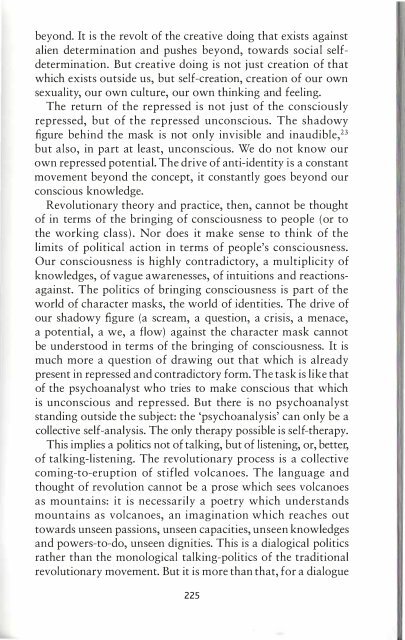CRACK CAPITALISM
Holloway - Crack Capitalism
Holloway - Crack Capitalism
- No tags were found...
You also want an ePaper? Increase the reach of your titles
YUMPU automatically turns print PDFs into web optimized ePapers that Google loves.
eyond. It is the revolt of the creative doing that exists against<br />
alien determination and pushes beyond, towards social selfdetermination.<br />
But creative doing is not just creation of that<br />
which exists outside us, but self-creation, creation of our own<br />
sexuality, our own culture, our own thinking and feeling.<br />
The return of the repressed is not just of the consciously<br />
repressed, but of the repressed unconscious. The shadowy<br />
figure behind the mask is not only invisible and inaudible,23<br />
but also, in part at least, unconscious. We do not know our<br />
own repressed potential. The drive of anti-identity is a constant<br />
movement beyond the concept, it constantly goes beyond our<br />
conscious knowledge.<br />
Revolutionary theory and practice, then, cannot be thought<br />
of in terms of the bringing of consciousness to people (or to<br />
the working class). Nor does it make sense to think of the<br />
limits of political action in terms of people's consciousness.<br />
Our consciousness is highly contradictory, a multiplicity of<br />
knowledges, of vague awarenesses, of intuitions and reactionsagainst.<br />
The politics of bringing consciousness is part of the<br />
world of character masks, the world of identities. The drive of<br />
our shadowy figure (a scream, a question, a crisis, a menace,<br />
a potential, a we, a flow) against the character mask cannot<br />
be understood in terms of the bringing of consciousness. It is<br />
much more a question of drawing out that which is already<br />
present in repressed and contradictory form. The task is like that<br />
of the psychoanalyst who tries to make conscious that which<br />
is unconscious and repressed. But there is no psychoanalyst<br />
standing outside the subject: the 'psychoanalysis' can only be a<br />
collective self-analysis. The only therapy possible is self-therapy.<br />
This implies a politics not of talking, but of listening, or, better,<br />
of talking-listening. The revolutionary process is a collective<br />
coming-to-eruption of stifled volcanoes. The language and<br />
thought of revolution cannot be a prose which sees volcanoes<br />
as mountains: it is necessarily a poetry which understands<br />
mountains as volcanoes, an imagination which reaches out<br />
towards unseen passions, unseen capacities, unseen knowledges<br />
and powers-to-do, unseen dignities. This is a dialogical politics<br />
rather than the monological talking-politics of the traditional<br />
revolutionary movement. But it is more than that, for a dialogue<br />
225


